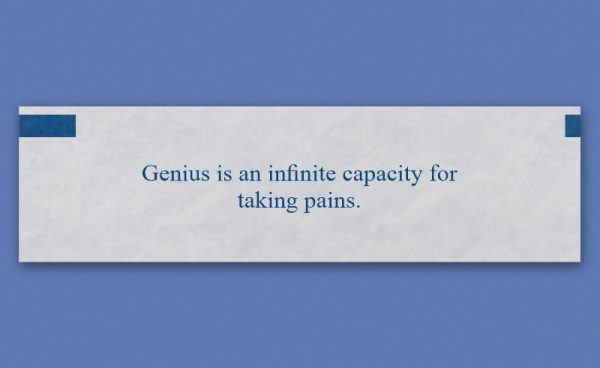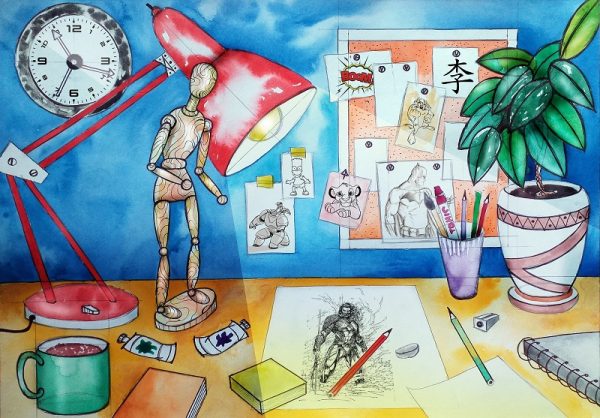Fortune Cookie Friday: Genius: Maybe They’re Born with It
You could type “geniuses” into a search engine and get all kinds of lists of famous people, from Leonardo da Vinci to Albert Einstein or Aristotle to Stephen Hawking. We called them geniuses because they astounded us with their skills and intellect.
It’s easy to honor someone on their abilities and just as easy to envy them. Geniuses stand out from the crowd when they’re alive, and their legacies live on well after they’ve passed. But are geniuses born that way?

Today’s fortune is attributed to Scottish Philosopher and Historian Thomas Carlyle. Author Sir Arthur Conan Doyle also used the quote with his character Sherlock Holmes.
Genius requires more than natural ability. I’m sure there are occasions when someone succeeds by a happy accident, but generally, success comes from hard work and perseverance, and our wisdom comes from experience, be it hands-on or learned.
The character of Sherlock Holmes displays a bit of this genius in “The Adventure of the Crooked Man” (1893):
‘Yes, I’ve had a busy day,’ I answered. ‘It may seem very foolish in your eyes,”’ I added, ‘but really I don’t know how you deduced it.’
Holmes chuckled to himself.
‘I have the advantage of knowing your habits, my dear Watson,’ said he. ‘When your round is a short one you walk, and when it is a long one, you use a hansom. As I perceive that your boots, although used, are by no means dirty, I cannot doubt that you are at present busy enough to justify the hansom.’
‘Excellent!’ I cried.
‘Elementary,’ said he. ‘It is one of those instances where the reasoner can produce an effect which seems remarkable to his neighbor, because the latter has missed the one little point which is the basis of the deduction.’Sherlock Holmes, in Doyle, Arthur Conan. 'The Adventure of the Crooked Man', Sherlock Holmes: The Complete Stories
Our fortune uses the word pains, which refers to spending a lot of time, effort, and care on something. We tend to lose sight of all the hard work that goes into being successful.
With a detective such as Holmes, he took the time to notice his associate’s travel patterns, the condition of his shoes, and a knowledge of the conditions on the streets. He deduced that Watson was too busy to walk on the muddy roads and instead took a horse-drawn carriage to get to all of his appointments.
Just as Holmes’s skill astounds Watson, I greatly appreciate artists who can create a drawing quickly or reproduce a particular style with relative ease. Cartoonists such as Charles M. Schulz (Peanuts), Bill Watterson (Calvin and Hobbes), and Gary Larsen (Far Side) had to have their work ready quickly for printing in the next issue.

Of course, I know the artists could whip off drawings so quickly because they had drawn the characters so frequently it was practically ingrained in muscle memory.
I also respect Edward Gorey’s works. Although a little unsettling, his pen and ink illustrations were narrative scenes in Victorian and Edwardian settings drawn in a Gothic style with great thematic detail. The artist didn’t create these works instantaneously, though. He took his time and great effort to make the elaborate details of fuzzy fur coats, gnarled wood, and patterned wallpaper and fabrics of the era.
The examples don’t stop with illustrators. Great composers, athletes, and surgeons all make their complex tasks look easy. We all must recognize that these skills take a long time to perfect. That quality of work doesn’t come naturally. It’s something people work towards with determination and fastidiousness.
Geniuses aren’t born with their abilities. They learned and earned them over time. Does that mean that anyone can be a genius? Technically, yes. We all can work hard, perfect our skills, and put them to good use, but we each need to make that determination on our own. Have you?




